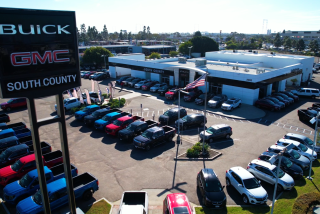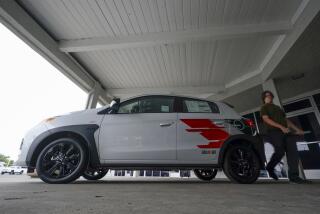Japan’s Car Buyers a Pampered Lot
- Share via
TOKYO — Japan’s manufacturers face a problem in 1986: how to sell 3 million cars in a country whose roads are jammed and where most people who want a car already have one.
Although their cars remain in great demand abroad, at home thousands of salesmen, most of them peddling door to door, have to run fast just to stand still.
No matter how hard the sell, few families can squeeze a second car into their tiny garages. So salesmen have to work hard to foster customers’ loyalty and keep them from switching brands at trade-in time.
Japanese drivers like a new car every three to five years. Dented, dirty old models are rare, and there is hardly any second-hand market.
To keep clients loyal from first car to last, companies lavish service on customers that would make the average mechanic-cursing Westerner drool.
“It’s the womb-to-tomb approach,” Nissan Motor’s Miki Kurosu said.
When Yoshiharu Hashimoto decided to buy a new car, dealers phoned repeatedly and lined up at his front door to leave visiting cards. “The top salesmen came over day after day,” Hashimoto said.
Mechanic Waiting at Door
The ultimately successful Honda salesman drove up with a new Accord model that he thought Hashimoto wanted. When Hashimoto vacillated, the salesman dashed off and returned with a different model.
And, to avert any last-minute hitch, a mechanic waited at the front door to make sure that all of the controls were adjusted precisely as the customer wanted them.
Unfortunately, the car leaked oil a few weeks later. And that brought the salesman back at once with a spare car for Hashimoto to use--for free--while his own was repaired.
There is plenty more such after-sales service, and the salesman will be checking back frequently to make sure his customer is satisfied.
“Japanese cars are all more or less the same and about the same price, so it doesn’t matter which you buy unless you want something specific,” Hashimoto said. “It all comes down to the human relationship the salesman has built.”
Personal service is more important than ever in today’s saturated market.
Last year, domestic sales by the nine major car companies actually fell--by 100,000 to slightly more than 3 million. There is now one car to every 2.8 people in the country.
So salesmen jostle to offer the extra personal touch that will persuade customers to sign on the dotted line. For example, Eiji Ashitani, a Mazda salesman in Hiroshima, visits up to 50 customers a day.
Some competitors note customers’ birthdays and anniversaries and send presents.
Tokyo Nissan plans for the day when details such as the birthdays of customers’ children will never be forgotten. They will be listed in the company computer, sales promotion manager Atsushi Horigome said.
Toyota Motors says its No. 1 salesman, who sells at least one car a day, once suggested that it might be a good idea to take flowers to sick customers.
The fight for customer loyalty has reached such a peak that Nissan is offering new buyers a five-day vacation in Thailand at a one-third discount from the normal fare. Nissan says it is well worth the $300 a head that it costs because it will strengthen the corporation’s relationship with clients--particularly at trade-in time, it is hoped.
Such relationships are especially important here because, by law, all cars in Japan have to have a major check-up every three years, and that can cost as much as $1,250.
Without fail, salesmen ring up well beforehand with a prompt reminder that the test is due. It sells a lot of cars.
Says Hashimoto: “They say that since you’re going to spend that much, why not buy a new car? And, of course, why not make it one of ours?”






